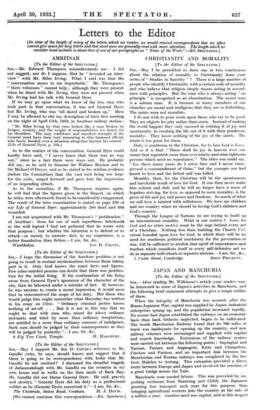Letters to the Editor
[In view of the length of many of the letters which we receive, we would remind correspondents that we often cannot give space for long letters and that short ones are generally read with more attention. The length which we consider most suitable is about that of one of our paragraphs on " News of the Week."—Ed. SPECTATOR.
AMRITSAR
[To the Editor of the SPECTATOR.] Sta,—Mr. Edward Thompson misunderstands me : I did not suggest, nor do I suppose, that he invented an inter- view " with Mr. Miles Irving. What I said was that the " conversation seems to me improbable." Mr. Thompson's " three witnesses " cannot help ; although they were present when he dined with Mr. Irving, they were not present when Mr. Irving had his talk with General Dyer.
If we may go upon what we know of the two men who took part in that conversation, it was not General Dyer, but Mr. Irving, who was "all dazed and broken up." Here I may be allowed to cite my description of their first meeting on the night of April 11th, 1919, in Amritsar railway station :
" Mr. Miles Irving by that time looked like a man broken by fatigue, anxiety, and the weight of responsibilities too heavy for his shoulders. The easy confidence and manifest strength of the General must have been very reassuring to this harassed official. who freely handed over a situation altogether beyond his control:' (Life of General Dyer, p. 164.) As to the matter of the conversation, General Dyer could hardly have said, " I ,never knew that there was no way out," since as a fact there were ways out. He probably did say, as he said to General Sir William Beynon and to Sir Michael O'Dwyer, and as he stated in his written evidence (before the Committee) that the vast mob being too large for the exits, surged forward and gave him the impression of an impending attack.
As to the casualties, if Mr. Thompson inquires again, he will find that the figures given in the Report, on which he relies, were afterwards found to be considerably exaggerated. The result of the later examination is stated on page 270 of my Life of General Dyer: approximately 280 dead and 000 wounded.
I am not acquainted with Mr. Thompson's " justification " of Amritsar : from his use of such superfluous falsehoods as the well legend I had not gathered that he wrote with that purpose ; but whether the intention is to defend or to attack—or merely to narrate—fact, in my experience, is a better foundation than fiction.—I am, Sir, he.,






































 Previous page
Previous page